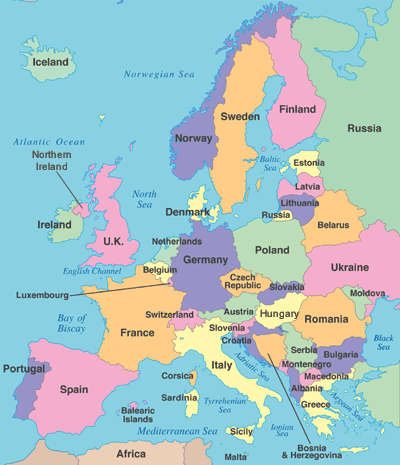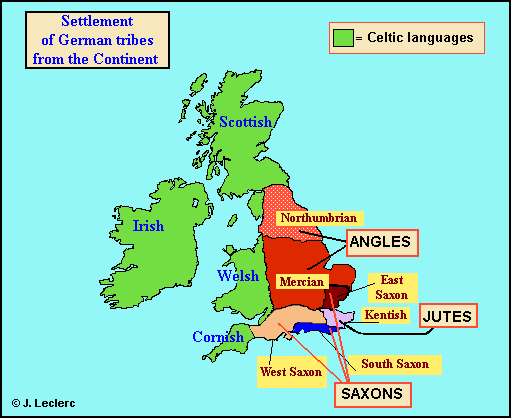Old English or Anglo-Saxon Age is the point where our studies of British Literature, in fact, the whole English literature, start. Beowulf, the work that marks the beginning of English Literature, was written in the Old English language. But some say that it was written in the Anglo-Saxon language. So, are these two languages the same?
There is no difference between Anglo-Saxon Language and Old English language. They are two names given to the language that Anglo-Saxon tribes spoke in England during AD 450-1066. Both these names depict the same language that was the earliest successor of modern English.
In this article, I have penned down the answer to this question & to many other questions that arise along the way.
It is important to note that this article is specifically meant for English literature students to help them quickly skim through the social backstory of the Old English language. Thus, you will find the content more fun & understanding-oriented rather than like a research paper.
| CONTENTS: What is Old-English Language? – Who were Anglo-Saxons? Why were they called Anglo-Saxons? How did their Germanic language become Old English? – A SIMPLE STORY! Why is the Old English Language also called Anglo-Saxon Language? Did Anglo-Saxons call their language Anglo-Saxon or Old English? – Why is the term “Anglo-Saxon” no longer used to refer to English people or their language? Frequently Asked Questions: – Is there a difference between Old English and Anglo-Saxon? – Did Anglo-Saxons use Old English? – Why is Anglo-Saxon / Old English not like modern English? |
What is Old-English Language?
What you’re reading through this article is Modern English. But, this Modern English has gone through a long…. long… journey to become what it is today.
When a human is in the infancy stage, we call it “a baby”. Later, as they grow up, we keep changing the names… “toddler”, “kid”, “teen”,… and so on.
But, calling it “a baby” doesn’t make it a different species. It is still human. Just a particular stage of being human.
Similarly,
Old English is a stage.
Old English is the name given to the baby stage of Modern English.
Let’s go back to 450 CE for a moment and see…
Britain had had multiple tribes who spoke their own specific tribal languages. Then Romans came and brought Latin with them.
Those who rule, make their language official – that’s obvious. That’s why Latin became the ruling language.
When they left, Germanic tribes like the Angles, Saxons, and Jutes came to England. They brought their Germanic languages with them.
So, by this point, the language of English residents has become a mishmash of original tribal languages, around 400 years of Latin influence, and the addition of Germanic languages.
This is the point where English takes birth. This baby stage of English is called “Old English”.
It later gets evolved and gets more and more influenced over the period to become today’s Modern English.
When we meet Yoda in the Star Wars films, we find him regularly inverting his word order, placing the object initially: “If a Jedi knight you will become…” This was a common Old English pattern – and we do not have any difficulty understanding it a thousand years on.
citation
By the way, this was just a brief account of what happened in England.
I recently wrote a more detailed (& concise) one! Do give it a read if you want to understand the Old English era better.
WHAT HAPPENED BEFORE & DURING THE OLD ENGLISH AGE? POLITICAL CONTEXT
Also, if you want to study more about the Old English Language, I would definitely recommend you to read this study:
The study of language in Anglo-Saxon England
Who were Anglo-Saxons? Why were they called Anglo-Saxons? How did their Germanic language become Old English? – A SIMPLE STORY!
First, see this picture:

Now, see this picture:
Now that you know from where exactly these tribes came, imagine you’re in the 5th century CE England.
The national boundaries have not been clearly defined yet. People are living in tribes. So, one tribe attacks the other tribe to capture the land and power. Winning tribe rules.
You are living with your fellow Britons happily in England. But, two tribes from the north, Picts, and Scots start attacking your people. You need help.
Don’t forget, you and your people – the Native Britons in 5th Century England, have a leader, Vortigern. He invites these Germanic tribes – Angles, Saxons, and Jutes for help.
After coming to England, these Germanic guys settle there.
This was a brief story of how the Germanic tribes came to England in the first place.
The interesting part is here –
Though these tribes – Angles and Saxons – came from a foreign land, they are not just the ones referred to when we say “Anglo-Saxons”.
Ethnically, when we say “Anglo-Saxons”, we mean Angles, Saxons, Jutes, all the Celtic inhabitants that were originally there, and Viking and Danish invaders.
Of all, the language and cultural influences of the Angles and Saxons were the strongest. That’s why their names are used dominantly.
Why is the Old English Language also called Anglo-Saxon Language?
Short answer –
Around AD 410, Germanic tribes such as the Angles, Saxons, Jutes, and Frisians came to England. They brought along their own languages. Their languages got mixed with the local languages over time. This mixture became Old English – the first, and the earliest, the infancy form of English.
Long answer –
The settlement of Angles, Saxons, Jutes, and possibly some other Germanic tribes led to the formation of 8 kingdoms in England. Each of these kingdoms had its own dialect depending on the tribe that got settled there.
Eventually, these dialects evolved and gained their own name from Historians – “Old English”.
Out of these tribes, the Angles, and the Saxons turned out to be the dominant tribes in numbers. So, the language that they brought along and made the norm in England started being called “Anglo-Saxon”.
Did Anglo-Saxons call their language Anglo-Saxon or Old English?
It is rather interesting to know that the Anglo-Saxons actually didn’t call themselves “Anglo-Saxons”. They called themselves englisc and angelcynn.
According to Historians, the name “Anglo-Saxon” was first used by continental writers. They meant the Saxons in England by “Anglo-Saxons”. While they meant Saxons in the European continent by “Old Saxons”.
Why is the term “Anglo-Saxon” no longer used to refer to English people or their language?
As we saw, the Anglo-Saxon term refers to the population of England before the Norman conquest. After that, the migration of people from all over the world to England evolved and restructured the ethnic culture of England.
Frequently Asked Questions:
Is there a difference between Old English and Anglo-Saxon?
No. Old English and Anglo-Saxon refer to the same language.
Did Anglo-Saxons use Old English?
Yes. Anglo-Saxons used the Anglo-Saxon language which is another name for Old English Language. So, to sum up, yes. Anglo-Saxons used the Old English language.
Why is Anglo-Saxon / Old English not like modern English?
Anglo-Saxons settled in Britain in the 5th century. After that, two major foreign invasions took place:
876 CE and 1003 to 1013 CE: Danelaw – Refers to those regions in England that were acquired by Danes (Northern Germanic tribe from southern Scandinavia).
1066 CE: Normans came to Britain (Norman Conquest). Therefore, for a time, French became the official language of Britain. (Marks the end of Old English Literature)
These foreign influences transformed Old English into what we call today Middle English.
If you have any questions about Old English Language or the Anglo-Saxon period, feel free to reach me at https://www.instagram.com/a_good_library/


